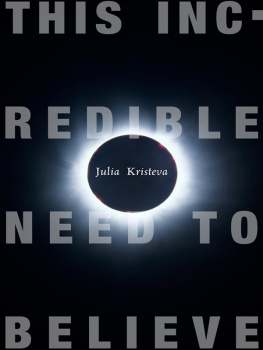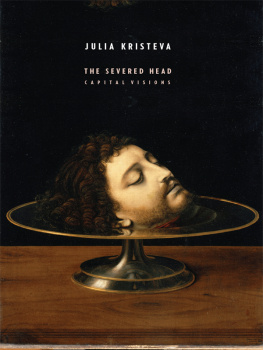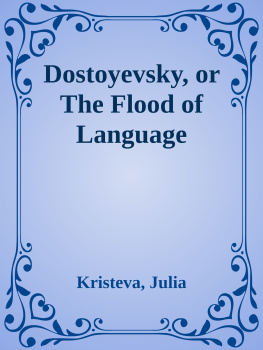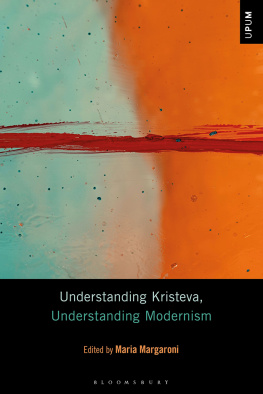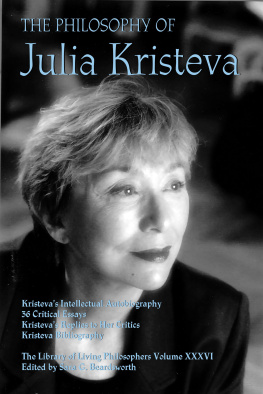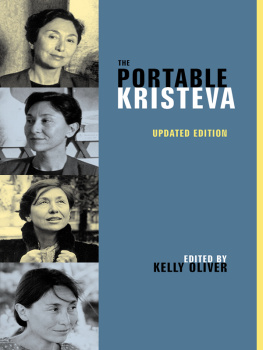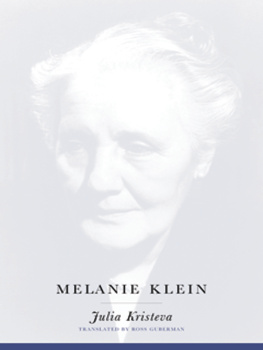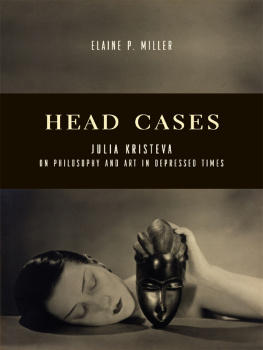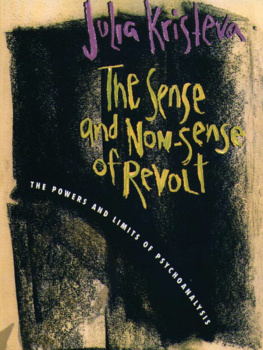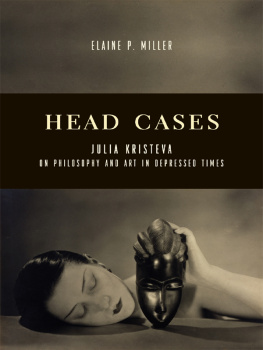This Incredible Need to Believe
EUROPEAN PERSPECTIVES
EUROPEAN PERSPECTIVES
A Series in Social Thought and Cultural Criticism
Lawrence D. Kritzman, Editor
European Perspectives presents outstanding books by leading European thinkers. With both classic and contemporary works, the series aims to shape the major intellectual controversies of our day and to facilitate the tasks of historical understanding. For a complete list of books in the series, see
COLUMBIA UNIVERSITY PRESS
Publishers Since 1893
New York Chichester, West Sussex
Bisogno di credere: Un punto di vista laico 2006 Donzelli Editore, Roma
Copyright 2009 Columbia University Press
All rights reserved
E-ISBN 978-0-231-51995-3
Library of Congress Cataloging-in-Publication Data
Kristeva, Julia, 1941
[Bisogno di credere. English]
This incredible need to believe / Julia Kristeva; translated by Beverly Bie Brahic.
p. cm.(European perspectives)
Includes bibliographical references and index.
ISBN 978-0-231-14784-2 (cloth: alk. paper)ISBN 978-0-231-51995-3 (e-book)
1. Belief and doubt. 2. Psychoanalysis and religion. 3. ChristianityPsychology. I. Title. II. Series.
BD215.K7513 2009
200dc22
A Columbia University Press E-book.
CUP would be pleased to hear about your reading experience with this e-book at .
References to Internet Web sites (URLs) were accurate at the time of writing. Neither the author nor Columbia University Press is responsible for URLs that may have expired or changed since the manuscript was prepared.
CONTENTS
Dear Frdric Boyer,
I was troubled when you asked if I would add a few pages to this little book, recently published in Italy at the instigation of my editor and friend Carmine Donzelli and in response to his questions. Ill come back to the need to believe, that narcotic that makes living easier, forhappy infantile and amorous traumait is the foundation of our capacity to be speaking beings. What worries me isnt that Id have to confide to youhere and nowthe intimate part of the alchemy that, for me, this paradoxical need to believe remains: joy and pain, expectation necessarily disappointed, and anguish nonetheless ever enlightening. No, more fundamentally, and in these somber times when the nihilistic certitude of some encounters the fundamentalist exaltation of others, what worries me is whether the believers, and especially those who believe they dont believe, will be capable of reading into my reflections a big question mark, as Nietzsche wrote, at the place of greatest gravity. An exorbitant wager underneath its apparent humility? An impossible wager? Cruel and very long-term?
It seems to me henceforth agreed that Christianity opened the vast field of the sacred to figuration and to literature: to the inner experience that goes from the quest of convulsive communion to the necessity I feel of questioning everythingfrom the abysses of childhood up to the unknown. This is the consequencesublime or destructive?of a disjunction, says Georges Bataille, that Christianity sanctioned: on the one hand, the putting to death of God, who represented and still represents the only opposable limit to irresistible desire, and, on the other hand, the resurrection of the divine in perfect moments, privileged situations, scalding communions. Paint, make music, tell stories: if your possession of the Holy Grail cannot be mistaken for God, it is its inheritance, its returna sort of returneven if it grows drunk on profaning him.
Faced with that continent we now call sublimation, intelligence, in a hurry, has done its best to limit reason to a calculating kind of consciousness: knowledge, as a result, has grown disinterested in inner experience, even going so far as to ignore its intrinsic authority.
For my part, like others but differently, I want here to take a step to one side: neither sublimatory intoxication nor controlling appropriation. An emotional, experiential, and sharable knowledge of the inner experience is possible: it is discursive, it rests upon psychoanalytic transference and takes the form of a theoretical hypothesis by definition ongoing and incomplete. Sigmund Freuds invention of the unconscious, and his interpretation of the free association offered him by his patients have rehabilitatedunbeknownst to the Viennese doctor?the authority of inner experience. In confronting Being with the death drive, or even Kant with the Marquis de Sade, Freuds successors have started to shake up the phenomenology of the person so as to locate the speaking subject at the crossroads of biology and the senses. They even go so farhow rash!as to dispossess theology of its thing [sa chose meme].
However, whatever the clinical advances of psychoanalysis and the theories of signification that it inspires, these are still far from attaining the level to which they aspire and can only hope to do so if the elucidation of the experience in transference and countertransference is heedful of the results of research in the life sciences, in philosophical discourse, sublimatory practices, and religious experienceas Freud was, from the start. Not so as to constitute a new absolute knowledge, but so that no data, confirmation, or model comes along to put a halt to the questioning, this endless prolongation of the access to the sacred that Christianity made possiblein a unique way because infinitely renewable. For modern humanism and the methodologies it forges, this will involve accessing psychosomatic experience in what makes of it a singular life, an ongoing rebirth, an unpredictable creativity.
That, from this point of view, faith be analyzable does not necessarily imply a method for getting by without italthough this too may be. The questioning of any and all entities, including belief and its objects, is one of Christianitys most impressive legacies; and humanism, its rebellious child, must not be prevented from developing this legacy. Are not the legitimate fears caused by secularization, all in all, negligible compared with the vitality of this other direction that inward experience now takes? I speak, as you will have gathered, of the inner experience from Freud on, that which is concerned to elucidate itself so as to deepen and diversify its advances, while taking care not to drift off course. We must not allow the clash of religions to lead us to the kinds of identity tensions that might block the way that Bataille, the author of Atheological Summa, described thus: To no longer want to be all things is to call everything into question.
It is in this spirit that I hear, as you invite me to, Saint Pauls well-known statement in 2 Corinthians 4:13I believed, and so I spokewhich for you resonates with certain pages of This Incredible Need to Believe. No doubt about it: you are still the subtle reader I praised in the days when you were writing your doctoral thesis on The Spiritual Experience in Dostoyevsky and Proustto which we must add the perspicacious editor you have since become! But what have I to contribute to what you already know, what your readers hear all the time, and what so many illustrious commentators have revealed to us?
Credi, propter quod locutus sum, says the Latin text, echoing Psalm 116:10: Credidi, etiam cum locutus sum: Ego humiliatus sum nimis. Epistevsa dio elalisa, says the Greek text, going back to the Greek translation of Psalm 116 in the Bible: Epistevsa dio elalisa. The Hebrew says: Heemanti ki adaber ; I had faith even when I said: / I am greatly afflicted / I who said in my consternation: Every man is a liar!
The context of the psalm is more explicit: it associates the faith (
Next page
